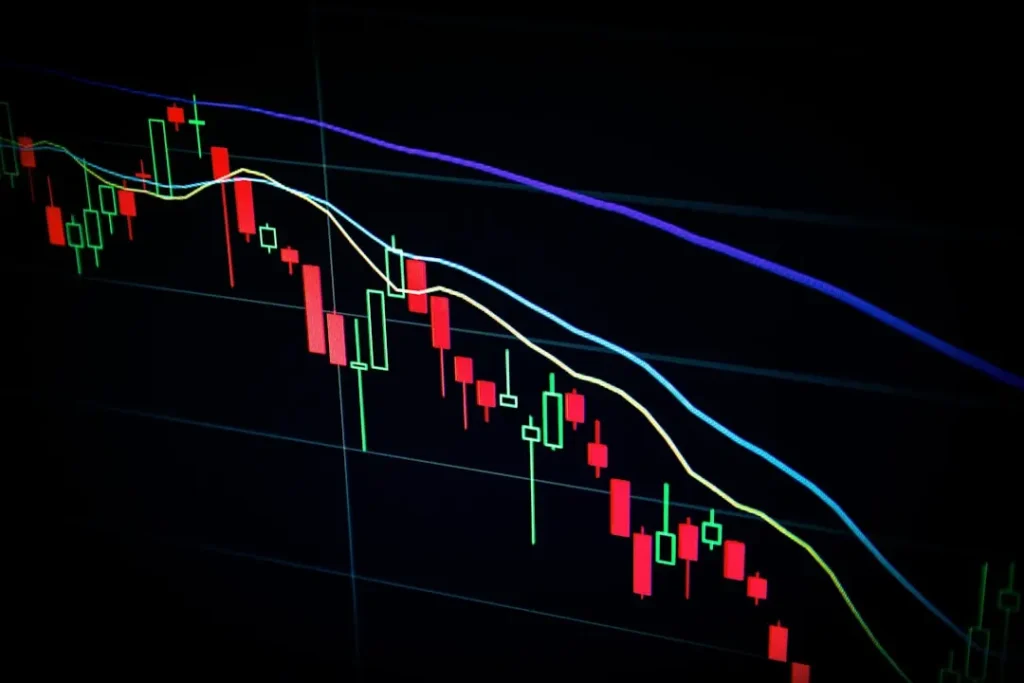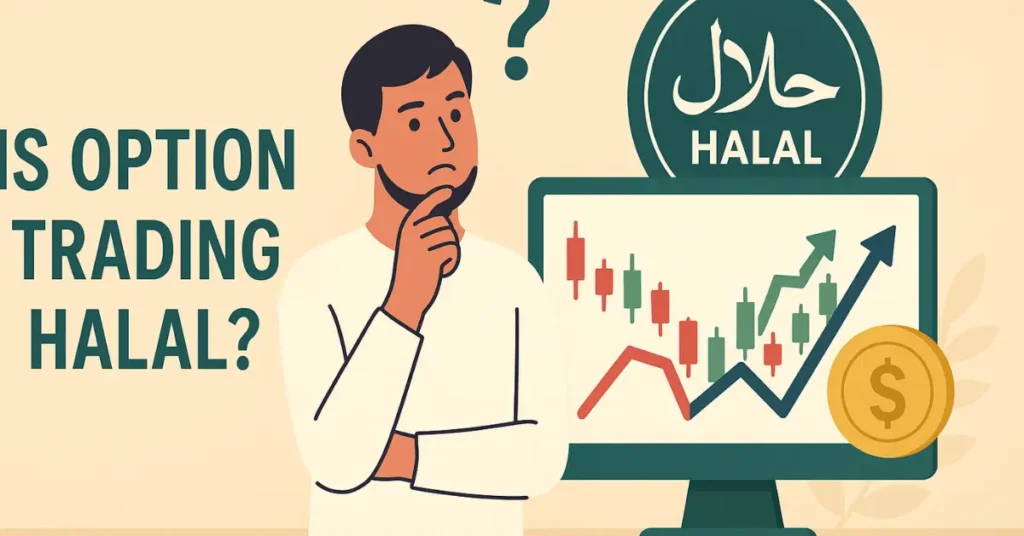In today’s complex financial landscape, Muslims seeking to grow their wealth while adhering to Islamic principles often face challenging questions about modern investment vehicles. Among these challenges, options trading stands as a particularly nuanced topic that requires careful examination through the lens of Shariah law.
With the global derivatives market worth trillions of dollars, understanding whether option trading is halal (permissible) or haram (forbidden) has become increasingly important for Muslim investors looking to diversify their portfolios while maintaining religious compliance.
Options trading, which gives investors the right but not the obligation to buy or sell assets at predetermined prices, has grown tremendously in popularity. However, its compatibility with Islamic finance principles requires thorough analysis considering fundamental concepts like riba (interest), gharar (excessive uncertainty), and maysir (gambling), which are all prohibited in Islamic financial transactions.
In this comprehensive guide, we’ll explore the Islamic perspective on options trading, examine scholarly opinions, review potential alternatives, and provide practical guidance for Muslim investors navigating these financial instruments in 2025.
What Are Options Contracts?
Before diving into the Islamic ruling on options trading, it’s essential to understand what options contracts actually are.
Understanding Options Basics
An options contract is a financial derivative that gives the buyer the right, but not the obligation, to buy or sell an underlying asset at a predetermined price (strike price) on or before a specific date (expiration date). For this right, the buyer pays a premium to the seller.
Options come in two basic forms:
- Call Options: Give the holder the right to buy the underlying asset at the strike price.
- Put Options: Give the holder the right to sell the underlying asset at the strike price.
For example, if you purchase a call option for Tesla stock with a strike price of $800 when the current market price is $750, you’re betting that the stock will rise above $800 plus the premium you paid. If it does, you can exercise your option and profit from the difference.
The Two Main Types of Options

1. Call Options
A call option lets the buyer purchase a specific asset at a fixed price before a certain date. People usually buy call options when they expect the price of that asset to go up.
Example: Ahmed purchases a call option for Company XYZ shares with a strike price of $50, expiring in 3 months. He pays a $3 premium per share. If the share price rises to $60, Ahmed can exercise his option to buy at $50, making a $7 profit per share ($60 – $50 – $3 premium).
2. Put Options
A put option allows the buyer to sell a certain asset at a fixed price before a set date. People buy put options when they think the price of that asset will go down.
Example: Fatima purchases a put option for Company ABC shares with a strike price of $100, expiring in 2 months. She pays a $5 premium per share. If the share price drops to $80, Fatima can exercise her option to sell at $100, making a $15 profit per share ($100 – $80 – $5 premium).
Islamic Finance Principles & Options Trading
To determine whether options trading is halal or haram, we must examine it through the lens of fundamental Islamic finance principles.
Key Principles of Islamic Finance

- Prohibition of Riba (Interest): Any transaction involving interest is strictly forbidden in Islam. Money should not generate money by itself without being associated with a productive activity.
- Prohibition of Gharar (Uncertainty): Transactions with excessive uncertainty or ambiguity are prohibited. Contracts should have clear terms and conditions.
- Prohibition of Maysir (Gambling): Any transaction resembling gambling or speculation is prohibited. Investments should be based on tangible assets and real economic activities.
- Asset-Backed Transactions: Islamic finance emphasizes that transactions should be tied to real assets rather than abstract financial instruments.
- Profit and Loss Sharing: Risk should be shared proportionately among the parties involved in a transaction.
The Concept of Money in Islamic Economics
In Islamic economics, money is viewed as a medium of exchange and not a commodity that can be traded for profit. It has no intrinsic value and should only facilitate the exchange of goods and services. This fundamental principle shapes how Islamic scholars view financial derivatives like options.
Islamic finance encourages investments that contribute to productive economic activities and generate real value, as opposed to purely speculative transactions. Therefore, any financial instrument that treats money as a commodity to be traded for profit is generally viewed with skepticism under Shariah law.
Scholarly Opinions: Is Option Trading Halal?
The majority of contemporary Islamic scholars and major Islamic financial institutions consider conventional options trading to be haram (forbidden). Let’s examine the key reasons behind this ruling.
The Majority View: Options Trading is Haram
According to most Islamic scholars, including prominent bodies like the Islamic Fiqh Academy and scholars such as Mufti Taqi Usmani, options trading is prohibited for several reasons:
1. Excessive Gharar (Uncertainty)
Options contracts contain significant uncertainty about whether they will be exercised. This uncertainty extends to:
- The future price movements of the underlying asset
- Whether the option will be exercised at all
- The ultimate benefit derived from the contract
The Islamic Fiqh Academy resolution no. 63 (1/7) states: “Option contracts as they are known today in the global financial markets are a new kind of contract that does not come under the heading of any kind of shari contracts… Because the object of the contract is not a specific item or benefit, or a financial right that could be compensated with something else, this type of contract is not permissible according to Islam.” IslamQA
2. Elements of Maysir (Gambling)
Many scholars argue that options trading contains elements of gambling because:
- Both parties essentially bet against each other on price movements
- The zero-sum nature of options transactions (one party’s gain is another’s loss)
- The speculative nature of most options trading activities
Dr. Sami Ibrahim al-Suwailem explains: “Options are tools of speculation and risk-taking with regard to prices. Therefore this contract comes under the heading of contracts that made the French economist Maurice Allais describe the global stock exchanges as huge casinos for gambling, because the essence of gambling means that one of the two parties gains at the expense of the other, and this is exactly what happens in the case of option contracts in the international markets.” IslamQA
Islamic scholars take issue with the premium paid for options:
- The premium represents payment for a right or promise, which many scholars don’t consider a valid subject for sale
- Some scholars view the premium as akin to riba (interest) since it’s added to the asset’s price
- The premium represents payment for something with no inherent value from an Islamic perspective
4. Selling What You Don’t Own
In options trading, particularly in the case of put options, the seller might not own the underlying asset at the time of the contract. This contradicts the Islamic principle that you cannot sell what you do not own.

The Minority View: Options May Be Permissible
A minority of Islamic scholars hold that certain types of options trading might be permissible under specific conditions:
- For Genuine Hedging Purposes: Some scholars permit options when used exclusively for risk management rather than speculation. This view recognizes the legitimate need for businesses to protect against price fluctuations.
- Real Economic Value: These scholars argue that options provide real utility through enhanced market liquidity and risk management mechanisms.
- No Pure Speculation: Under this view, options might be acceptable if they’re tied to genuine business needs rather than speculative motives.
As noted by Islamic Finance Guru: “In cases of genuine need, for example currency exchange fluctuations for an international business with global supply chains, a more flexible, lenient approach is advisable. If you are such a person you should check in with a scholar about your particular circumstances.” Islamic Finance Guru
Islamic Alternatives to Conventional Options
For Muslim investors seeking Shariah-compliant alternatives to conventional options, several structures have been developed that aim to provide similar economic benefits while adhering to Islamic principles.
1. Arbun (Down Payment)
How Arbun Works
Arbun involves the buyer making a down payment (arbun) to the seller as part of the purchase price of an asset. The buyer then has the choice to either:
- Complete the purchase by paying the remaining amount within a specified period, or
- Forfeit the down payment if they choose not to proceed with the transaction
The key distinction from conventional options is that arbun represents a partial payment toward the asset rather than just a premium for the right to buy or sell.
Key Differences from Conventional Options:
- Arbun cannot be traded in secondary markets (unlike options)
- The down payment is part of the purchase price (not a separate premium)
- It’s tied directly to asset ownership
- The transaction must be completed or abandoned; there’s no selling of the right itself
2. Wa’d (Unilateral Promise)
Wa’d is a unilateral promise by one party to undertake a certain action in the future. Unlike options, a wa’d:
- Cannot be traded or sold to third parties
- Doesn’t involve payment for the promise itself (though some institutions do charge fees)
- Must be tied to a genuine need rather than pure speculation
Some Islamic financial institutions use wa’d structures to create Shariah-compliant hedging instruments. However, scholars debate the permissibility of charging fees for wa’d arrangements.
3. Salam Contracts
While not a direct replacement for options, salam contracts allow for advance purchase of commodities with payment made upfront and delivery at a future date. This can provide some of the hedging benefits of options while complying with Shariah principles.

Comparison Table: Conventional Options vs. Islamic Alternatives
| Feature | Conventional Options | Arbun | Wa’d |
|---|---|---|---|
| Payment | Premium (separate from asset price) | Down payment (part of asset price) | Typically no payment (some institutions charge fees) |
| Tradability | Can be traded in secondary markets | Cannot be traded | Cannot be traded |
| Underlying Asset | Not necessarily owned by seller | Must be owned by seller at contract time | Not applicable (promise only) |
| Purpose | Often speculative | Purchase intention | Typically for hedging only |
| Obligation | Right but no obligation | Right to complete or forfeit down payment | Moral obligation to fulfill promise |
| Scholarly Acceptance | Majority view: Not permitted | Widely accepted | Accepted with conditions |
Practical Guidance for Muslim Investors
If you’re a Muslim investor concerned about the permissibility of options trading, consider the following practical steps:
1. Clarify Your Investment Purpose
The intention behind your investment matters significantly in Islamic finance:
- For Pure Speculation: Most scholars agree that using options solely for speculation is not permissible.
- For Genuine Hedging: If you run a business with real exposure to price fluctuations (like international trade), consult with a qualified scholar about potential exceptions.
2. Explore Shariah-Compliant Alternatives
Consider these Shariah-compliant investment alternatives instead of options:
- Islamic ETFs and Mutual Funds: These invest in Shariah-compliant companies and often have their own Shariah boards.
- Sukuk (Islamic Bonds): Asset-backed certificates that provide regular income without interest.
- Direct Equity Investments: Purchasing shares in Shariah-compliant businesses.
- Real Estate: A tangible asset class that can provide both income and appreciation.
3. Seek Specialized Advice
- Consult Islamic Scholars: Speak with qualified scholars who specialize in financial transactions.
- Islamic Financial Advisors: Work with advisors who understand both investment markets and Shariah requirements.
Market Overview: Islamic Finance Growth and Development
The Rise of Islamic Finance
The global Islamic finance industry has experienced remarkable growth over the past two decades, with assets estimated to exceed $2 trillion and growing at 15-25% annually. This growth reflects increasing demand for Shariah-compliant financial products across Muslim-majority countries and beyond.
Major financial centers including London, Dubai, Kuala Lumpur, and Singapore have positioned themselves as hubs for Islamic finance, developing specialized regulatory frameworks and product offerings to attract Muslim investors.
As the industry matures, financial institutions continue to innovate, creating more sophisticated Shariah-compliant alternatives to conventional financial instruments. This innovation extends to derivatives markets, with ongoing efforts to develop options-like products that satisfy both market needs and religious requirements.
Key Developments in Islamic Finance Alternatives to Options
- Standardization Efforts: Organizations like AAOIFI (Accounting and Auditing Organization for Islamic Financial Institutions) are working to standardize Shariah-compliant derivatives.
- Increased Adoption of Wa’d Structures: Major Islamic banks have developed sophisticated wa’d-based hedging instruments that provide some features of options without violating Shariah principles.
- Technology Integration: Fintech innovations are making Islamic financial products more accessible, with several platforms now offering Shariah-compliant investment alternatives.
- Growing Acceptance: Even conventional financial institutions are increasingly offering Islamic windows or products to serve Muslim investors.
Expert Analysis and Investor Takeaways
When evaluating options trading from an Islamic perspective, several key considerations emerge:
- Majority Scholarly Opinion: The consensus among most Islamic scholars is that conventional options trading as practiced in modern financial markets is not permissible due to elements of gharar, maysir, and concerns about the premium payment.
- Intention Matters: The purpose behind using options—speculation versus genuine hedging needs—may influence permissibility for specific situations.
- Alternatives Exist: Shariah-compliant structures like arbun and wa’d can provide some of the risk management benefits of options while adhering to Islamic principles.
- Ongoing Evolution: Islamic finance continues to develop more sophisticated instruments to address market needs within Shariah boundaries.
“Muslims should focus on investing for the long term instead of trading. Trading is a skilled profession that takes a lot of work to become really good at and the risks are substantial compared to long term investing.” – Islamic Finance Guru
Conclusion: Making Informed Decisions
The question “Is option trading halal?” doesn’t have a simple yes or no answer that applies universally to all situations. However, the majority scholarly position is clear: conventional options trading as practiced in modern financial markets contains elements that conflict with Islamic principles and is generally considered haram.
For Muslim investors seeking to grow their wealth while adhering to Islamic principles, the best approach includes:
- Understanding the underlying concerns with options from a Shariah perspective
- Exploring the growing universe of Shariah-compliant investment alternatives
- Consulting with qualified Islamic scholars and financial advisors for personalized guidance
- Focusing on long-term, ethical investments rather than speculative trading
By prioritizing investments that align with both Islamic principles and your financial goals, you can build wealth in a manner that brings both material and spiritual benefits.
Frequently Asked Questions
Why do most Islamic scholars consider options trading haram?
Most Islamic scholars consider options trading haram primarily because of three key concerns:
- Excessive uncertainty (gharar): Options contracts involve significant uncertainty about whether they’ll be exercised and their ultimate value.
- Elements of gambling (maysir): The speculative nature of options trading resembles gambling, with one party’s gain often coming at another’s loss.
- Issues with the premium payment: The premium represents payment for a right or promise, which many scholars don’t consider a valid subject for sale under Islamic principles.
Additionally, options trading often involves selling rights to assets one doesn’t own, which contradicts the Islamic principle that you cannot sell what you do not own.
Are there any circumstances where options might be permissible in Islam?
A minority of scholars hold that options might be permissible under specific conditions:
- When used exclusively for genuine risk management (hedging) rather than speculation
- In cases of genuine business need, such as protecting against currency fluctuations for international businesses
- When structured differently from conventional options to avoid prohibited elements
However, these represent minority opinions, and individuals should consult with qualified scholars about their specific circumstances.
What is the difference between arbun and conventional options?
While arbun may seem similar to conventional options, key differences include:
- In arbun, the initial payment is part of the purchase price, not a separate premium
- Arbun cannot be traded in secondary markets like options
- In arbun, the seller must actually own the asset at the time of contract
- The arbun payment is forfeited if the buyer doesn’t complete the transaction, but becomes part of the purchase price if the transaction is completed
These differences make arbun acceptable to many Islamic scholars while conventional options remain problematic.
How can Muslim investors protect against market volatility without using options?
Muslim investors can manage market volatility through several Shariah-compliant strategies:
- Diversification: Spreading investments across different asset classes, sectors, and geographies
- Islamic hedging instruments: Using Shariah-compliant structures like wa’d-based products offered by Islamic financial institutions
- Strategic asset allocation: Adjusting portfolio allocations based on risk tolerance and market conditions
- Long-term investment approach: Focusing on fundamental value rather than short-term price movements
- Mutual takaful arrangements: Islamic cooperative insurance against certain risks
Can I use options for hedging purposes only?
While some minority opinions allow options exclusively for hedging (not speculation), most scholars still consider conventional options impermissible regardless of purpose. The issues with gharar (uncertainty), the premium payment, and other structural aspects remain problematic.
For hedging needs, consider consulting with an Islamic financial advisor about Shariah-compliant alternatives like wa’d-based structures specifically designed for risk management purposes. Many Islamic banks offer customized solutions for businesses with genuine hedging requirements.
What are Islamic ETFs and how do they differ from conventional ETFs?
Islamic ETFs (Exchange Traded Funds) are investment funds traded on stock exchanges that hold only Shariah-compliant assets. They differ from conventional ETFs in several ways:
- Screening process: They exclude companies involved in prohibited activities (alcohol, gambling, interest-based financial services, etc.)
- Financial ratio filters: They typically exclude companies with excessive debt, interest income, or impermissible revenue
- Purification process: They calculate and remove any impermissible income that may incidentally occur
- Shariah oversight: They maintain a Shariah supervisory board to ensure ongoing compliance
Islamic ETFs offer a convenient way for Muslim investors to gain diversified market exposure while maintaining Shariah compliance.
How does the concept of gharar apply to modern financial markets?
Gharar (excessive uncertainty or ambiguity) is prohibited in Islamic finance because it can lead to disputes, exploitation, and unjust enrichment. In modern financial markets, gharar is evaluated based on:
- Degree of uncertainty: Not all uncertainty is prohibited; only excessive uncertainty that affects core contract elements
- Necessity: Some uncertainty may be tolerated if the transaction fulfills a genuine need
- Transparency: Clear disclosure of all known information and risks reduces gharar
- Speculative intent: Transactions undertaken primarily for speculation rather than real economic utility are more likely to involve prohibited gharar
Derivatives like conventional options often contain excessive gharar because they involve uncertainty about whether the option will be exercised and the ultimate outcome of the transaction.
Recommended Videos:



